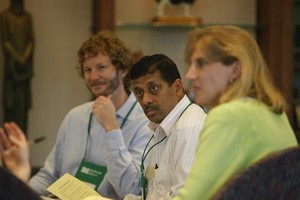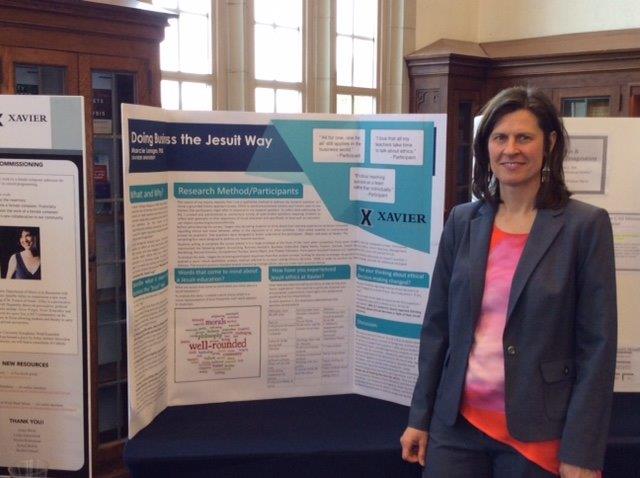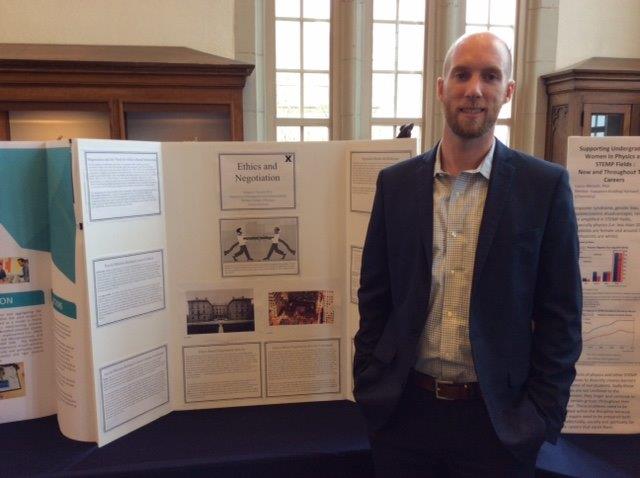Management and Entrepreneurship
Quick Links:
- The perceived role of ethics and social responsibility: What factors in the management curriculum influence this perception?
- From Pentagon to Heptago
- Exploring the Role of Jesuit Values in the Experience of Work
- Development of a Community Engaged Immersive Learning Project for a Human Resource Management Course, Applying Cura Personalis and Reflection to Develop Business Leaders Able to Address Social Justice Issues with HRM
- Integrate Ethics in Operations Management: A Field Study Approach
- Following Xavier's Footsteps: International Management
- Encouraging Ignatian-based Xavier Values in Management Thinking
- Doing Business the 'Jesuit' Way
- Consumer Communities Do Well, But Can They Do Good? An Ignatian Mentoring Project Problem Introduction
- Development of an Alternative Spring Break Experience Focusing on Social Entrepreneurship and Discernment
- Integrating Ignatian Values into Entrepreneurship Teaching and Practice
- Ethics and Negotiation
- Ignatian Mentoring Program Project: Ethics in the Workplace
- Can Ethics Be Taught in Operations Management Course?
- Intuiting Ignatius In Corporate Culture: Ignatian Values In The Workplace
The perceived role of ethics and social responsibility: What factors in the management curriculum influence this perception?
Rashmi H. Assudani, Ph.D.
Mentor: David Burns, D.B.A. (Marketing)
 Acknowledgements:
Acknowledgements:
I'd like to extend my appreciation to the Ignatian Mentoring Program for providing this opportunity to me. I would also like to express my thanks to my mentor David Burns and Debra Mooney for their tremendous support.
Central Idea
The current corporate world is riddled with fraud and corporate scandals. Many times the perception of what is 'ethical' (or not) may be blurred. This project seeks to examine the factors in the management curriculum that influence the perception of students of ethical and socially responsible business practices. I have started with the hypothesis that if ethics are part of the active discourse in a course, students are likely to be more sensitive to make ethical and socially responsible (business) decisions. I conducted this research in two subsequent semesters in the MGMT 300 (Managerial Behavior) course that I teach at the undergraduate level.
Back to Top
id="From_Pentagon_to_Heptagon" name="From_Pentagon_to_Heptagon" style="background-color: #ffffff; color: #001f3f; text-decoration-line: underline;"From Pentagon to Heptagon - Making Jesuit Values Pragmatic
Ravi Chinta, Ph.D.
Mentor: Diane Ceo-DiFrancesco, Ph.D. (Modern Languages)
Introduction

Read full text of "From Pentagon to Heptagon - Making Jesuit Values Pragmatic"
Exploring the Role of Jesuit Values in the Experience of Work
Dr. Tamara L. Giluk, Ph.D.
Mentor: Dr. Victoria Zascavage Ph.D. (Secondary and Special Education)
Impetus
The Jesuit ideal gives serious attention to profound questions about the meaning of life; work, of course, plays a large role in many individuals' lives. With the assignment described below, I hoped to give students an opportunity to explore the role that work plays in individuals' lives and how Jesuit values might be integrated into that experience. Many students will be managers and leaders of others and their work in the future. I hoped to encourage students to open their minds and hearts to understand experiences other than their own. In previous semesters, class discussions had brought to the surface assumptions on the part of some of the students that I found to be disturbing, for example, that the phenomenon of intrinsic motivation (i.e., behavior performed for its own sake, engendering enjoyment, accomplishment, pride, etc.) was limited to those who were college-educated and/or in professional-level roles rather than those without a college education and/or in low-skill jobs. My expectation was that understanding individuals' experiences of work would 1) facilitate students' understanding of and respect for others and their work, and 2) shape their thinking about how the Ignatian and Jesuit values so critical to their formation at Xavier can also inform their work experience as well as leadership philosophy and behaviors.
Read full text of "Exploring the Role of Jesuit Values in the Experience of Work"
Development of a Community Engaged Immersive Learning Project for a Human Resource Management (HRM) Course, Applying Cura Personalis and Reflection to Develop Business Leaders Able to Address Social Justice Issues with HRM
Greg Falcon Hardt, PhD ABD
Mentor: Cam Cockrell
Overview
This alternative project is designed to integrate HR processes and issues related to “finding dignified, stable work that offers sufficient pay and benefits” in order to provide a quality of life for the worker and their families. These goals are challenging in ways not typically considered, but they are made real from generational poverty and inconsistent work histories. Students are introduced to a corporate partner that gives a brief overview of the HR department and the typical applicant experience. Students will discuss how things should work for applicants and businesses as they move through the hiring process. Next students walk to a non-profit support partner that provides services for individuals who are in need of services to help them find, apply for, interview for, and maintain a job for at least a year.
Read full text of "Development of a Community Engaged Immersive Learning Project for a HRM Course"
Integrate Ethics in Operations Management: A Field Study Approach
Alan Jin, Ph.D.
Mentor: Dave Hyland, Ph.D. (Finance)
Acknowledgements:
I would like to extend my appreciation for the opportunity provided by the Ignatian Mentoring Program for the great support, and express my thanks to my mentor Dr. Dave Hyland for his generous time and great guidance.
Introduction:
Ethics lies at the core of Jesuit education. In the operations/supply chain management area, it's important for our students to learn why and how to operate a business in an ethical way, when they design goods/services/facilities, select processes and layouts, source materials, produce products and services, manage quality, plan logistics systems, etc. In this area, we have seen numerous opportunities, challenges, success stories, and failures. The earlier our students can learn this, the more our society will benefit from them.
I made significant changes to my syllabus and course materials to integrate ethics in my operations management course using ethics-related cases, discussions, videos, and field studies. Building the connection between ethics issues and the operations course concepts helped strengthen students' knowledge in both ethics and operations management, according to the student feedback.
Read full text of "Integrate Ethics in Operations Management: A Field Study Approach"
Following Xavier's Footsteps: International Management
Mina Lee, PhD
Mentor: Mee-Shew Cheung, PhD (Marketing)

COURSE OBJECTIVES
The mission of the Williams College of Business (WCB) appears below:
We educate students of business, enabling them to improve organizations and society, consistent with the Jesuit tradition.
The primary objective of this course is to understand the world at the time when St. Francis Xavier traveled. Related to that, students are expected to learn the world today, as previous Jesuits did.
St. Francis Xavier was born in Spain, educated in France, traveled Mozambique (Africa), India, China, Sri Lanka, Japan, Indonesia, and died at China in 1552. In this course, we will discuss his itinerary to comprehend an extraordinary global traveler before the era of globalization.
Read full text of "Following Xavier's Footsteps: International Management"
Encouraging Ignatian-based Xavier Values in Management Thinking
Reginald Tomas Lee, PhD
Mentor: Tim Miller, PhD (Accounting)
Situation
Xavier, being a Jesuit university that is fully vested in the teachings and philosophy of St Ignatius, has an opportunity and responsibility to help students understand, internalize, and act using Xavier’s Ignatian -based values of reflection, discernment, solidarity in kinship, service rooted in justice and love, Cura personalis, and Magis. The school begins this process by ensuring our undergraduate core course curricula supports and reflects these values. The expectation, then, should be continuity from the core curricula into non-core and courses in our students’ majors. This will provide opportunities to practice, think, and use Xavier’s Values, and see how the values are in unison with, and support learning, understanding, and action in areas related to the students’ primary interests. The expectation is that the values are ingrained in the students’ thought processes and become important tools in the toolbox of knowledge received from Xavier.
In the case of this particular application, the interest is in applying these values to business education; specifically MGMT 200 - Organizational Management. MGMT is a brand new course that will be offered for the first time in Fall 2020. It is a combination of a number of courses taught previously. As such, this report is more forward looking (What will we do) rather than backward looking (What did we do?). This course has these basic high-level objectives for the students:
Read full text of "Encouraging Ignatian-based Xavier Values in Management Thinking"
Doing Business the 'Jesuit' Way
 By Marcia Lensges, PhD
By Marcia Lensges, PhD
Mentor: Dr. David Hyland
In his 1989 article in Boston College Magazine on the five traits of Jesuit education, Robert Mitchell, S.J. (1989) states that one of the key tenants of education is an emphasis on both personal and professional ethics. Father Mitchell goes on to explain how this unfolds: "Jesuit institutions today feel compelled by their tradition to raise these questions for their students, not through sloganeering and political maneuvering, but in a way that is proper for higher education: through learning, research, reflection and imagination." In my managerial behavior classes, I attempt to do just this, using stories and scenarios that prompt reflection and discussion among my students. But I have never asked students to reflect on their own journey in developing their morality and how engaging in learning at a Jesuit institution might inform their view of ethical issues, particularly in a business context. The purpose of this paper is to reveal my journey and findings when I asked my business students the question "What does it mean to do business the 'Jesuit' way?"
Read full text of "Doing Business the 'Jesuit' Way"
Consumer Communities Do Well, But Can They Do Good? An Ignatian Mentoring Project Problem Introduction
Dr. James Loveland
Mentor: Dr. Mina Lee
Over the last decade, the relationship between consumers and brands has become a focal point of both academic research and corporate activity. Consumers are more demanding of their brands, and actively consider not only factors such as product quality, but also the nature of the firms that make their products, and the types of consumer-brand relationships that might be engendered by choosing one brand over another. For example, many consumers want to know that their brands are engaging in prosocial behaviors and supporting causes important to them (cf. Bhattacharya and Sen 2004); many consumers also participate in brand and consumer communities, so that they can build relationships with their fellow consumers (e.g. Muniz and Guinn 2001). These communities also represent a significant strategic asset for firms, and so many firms have accepted the reality that building relationships with consumers, and focusing on these relationships from a customer-centric perspective (Fournier 1998) provides an important means of building customer loyalty, for addressing consumer concerns, and for communicating the different prosocial activities that the firm is engaged in. Ultimately, these communities have the potential to create firms which must be accountable to their constituents, and to create organizations that can take pride in enacting social change.
Development of an Alternative Spring Break Experience Focusing on Social Entrepreneurship and Discernment
Rebecca Luce , Ph.D.
Mentor: Stephanie Brzuzy (Social Work)
Acknowledgements
I would like to thank both Stephanie Brzuzy and Debra Mooney for their enthusiasm and support in working on the ideas for this program, especially as it relates to information and suggestions regarding incorporation of the Jesuit tradition of discernment. Discernment was an unknown process to me when I began work on this project and it has become a topic of substantial interest since I have been introduced to it by both Stephanie and Debra. I expect it to have a lasting influence on the way I make decisions and evaluate the course of my life.
Integrating Ignatian Values into Entrepreneurship Teaching and Practice
Matthew D. Regele, Ph.D.
Mentor: Greg Smith, Ph.D.
Introduction
I began this project with the belief that an Ignatian-based entrepreneurship education model could help Xavier Entrepreneurship students and graduates navigate DSE. I also believe that the model could have value well beyond Xavier, including in other Jesuit and non-Jesuit universities, and in entrepreneurship support organizations, such as business accelerators. In Summer and Fall 2022, I will work to build out the model, as well as develop pedagogical resources that will help faculty teach to that model. I will undertake this work as the Center for Mission & Identity’s 2022 Conway Faculty Fellow. My Ignatian Mentoring Program Project has aimed to jumpstart this work. Specifically, I used my ENTR 494: Social Entrepreneurship & Innovation course as a sort of laboratory to develop and test a lesson plan focused in DSE and Ignatian values.
Read full text of "Integrating Ignatian Values into Entrepreneurship Teaching and Practice"
Back to Top
Ethics and Negotiation

Zachary A. Russell, Ph.D.
Mentor: Russell Lacey, Ph.D.
Acknowledgements
Thank you to Russell Lacey for his guidance and support throughout the program. I would also like to thank the Ignatian Mentoring Program for providing this opportunity to increase my own knowledge of Jesuit values and, in turn, better incorporate these values into my curriculum.
Introduction
"Negotiation is an interpersonal decision-making process necessary whenever we cannot achieve our objectives single-handedly. Negotiations include one-on-one business meetings, but also multiparty, multicompany, and multinational relationships. Whether simple or complex, negotiations boil down to people, communication, and influence" (Thompson, 2012, p. 2). Negotiation is omnipresent in the daily lives of all individuals. Representing one's organization and negotiating relations with another organization, attempting to garner internal firm resources for increased task performance, negotiating compensation packages throughout one's career, settling disagreements with college roommates, and determining who will complete household chores with one's significant other all represent instances in which negotiation and conflict management skills are vital to one's success in achieving what he or she desires.
Read full text of "Ethics and Negotiation"
Ignatian Mentoring Program Project: Ethics in the Workplace
Alex J. Scrimpshire, Ph.D.
Julie Cagle, Ph.D. (Finance)
Introduction
Workplace ethics have been a priority for some time, but have recently come under much more scrutiny. When the scandals from companies like Enron, Adelphia, and WorldCom emerged in the public view in the late 2000s, there was a tipping point of frustrations and perceived lack of unfairness in the business world, which lead to the creating of the Dodd-Frank Act in 2010 (Verschoor, 2018), which required top management to be responsible for the reporting of their businesses’ financial reports. While this was an important step in ensuring accountability from those in control, this did not guarantee companies and individual employees would still act ethically. A 2018 survey found that employees who had noticed some form of ethical misbehavior (e.g., accepting bribes, stealing, sexual harassment, offering products that failed specifications, etc.) was at an all-time high of 69% (Verschoor, 2018). This does not bode well for the future of not only workplace ethics, but also the trust from the public that companies are actually doing the right thing.
Read full text of "Ignatian Mentoring Program Project: Ethics in the Workplace"
Can Ethics Be Taught in Operations Management Course?
Lifang Wu, Ph.D..
Mentor: Peter Bycio, Ph.D. (Management and Entrepreneurship)
Course Information (MGMT 903 Operations Management) 
Operations Management refers to the systematic design, direction, and control of processes that transform inputs into services and products for external, as well as internal customers. The course is one of the few MBA core courses required by AACSB. Usually, various concepts and decision-making models related to issues such as operations strategy, process improvement, quality control, inventory, and supply chain management are introduced. The main purpose of this course is to provide XU MBA students with a thorough introduction to the concepts and skills needed to understand the role of the operations in the success of an organization, to lead efforts and make appropriate decisions in the operations functions of their organizations, and to analyze and improve various business processes.
Read full text of "Can Ethics Be Taught in Operations Management Course?"
Intuiting Ignatius In Corporate Culture: Ignatian Values In The Workplace
David B. Zoogah
Mentor: Ariyachandra Thilini Management Information Systems
Abstract
In this exploratory study, I examine Ignatian values to see if they relate to corporate culture. Using values theory and content analysis methodology I find that (1) among the Jesuit colleges and Universities, there is no consistency in the use of the Ignatian values, (2) the Ignatian values are embedded in those colleges and universities that use them relative to Protestant Universities, and (3) the Ignatian values have some similarity with corporate values.
Read full text of "Intuiting Ignatius In Corporate Culture: Ignatian Values In The Workplace"
To provide feedback, please email: jesuitresource@xavier.edu
Jesuitresource.org is developed by The Center for Mission and Identity at Xavier University with support from the Conway Institute for Jesuit Education. Learn more about Jesuit Resource.
